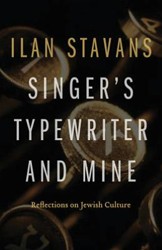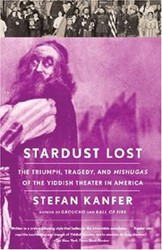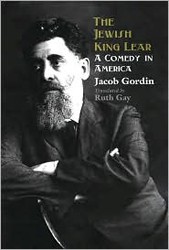By
– June 25, 2012
In his most recent work, Jeffrey Shandler does an enormous service for anyone who studies or cares about Yiddish language and literature. His analysis of the postvernacular Yiddish culture which arose following World War II, when Yiddish speakers diminished from approximately 11,000,000 to an estimated one million, is clear and elegantly written. The postwar postvernacular, he explains, is what we have with us today, when the language is no longer spoken by great numbers.
At the outset, Shandler declares that his work focuses on “examples of Yiddish culture considered to be the most popular or accomplished.” Although he says it is selective, it covers a wide range: literary translation, college classes in Yiddish, Yiddish textbooks, conversation groups, performance, summer camps, and klezmer festivals, as well as stickers, T‑shirts, children’s and adults’ board games, even refrigerator magnets. In addition, he describes the efforts of people teaching their children Yiddish today and the many places at which adults of all ages study the language, including Oxford, Paris, Vilnius, and YIVO (now based at NYU).
The chapter “Founded in Translation” is one of Shandler’s best and has as its epigraph the words of the Yiddish literary critic, Shmuel Niger: “One language has never been enough for the Jewish people.” Translators of 19th and early 20th century literature, whose work has made the leap from Yiddish to English or Hebrew to Yiddish possible, also have made world literature— such as the works of Shakespeare, Longfellow, Wilde, Poe, Spinoza, and Strindberg— available in Yiddish. Shandler considers especially noteworthy the translation of the Torah into Yiddish by Yehoash (Solomon Bloomgarden).
Shandler points out the problems Yiddish speakers new to America experienced going from Yiddish to English, as illustrated by Irena Klepfisz’s “Fradel Schtok”; this poem exemplifies what it means for a Yiddish writer to be lost in translation. In a careful analysis, he also demonstrates why Cynthia Ozick’s story, “Envy; or, Yiddish in America,” is the most widely known treatment of postwar Yiddish culture in the U.S.
Most people who have not studied the language would probabaly disagree with Kafka’s declaration: “you understand Yiddish better than you suppose,” but Jeffrey Shandler ably shows that because of the many aspects of postvernacular culture in our post-Holocaust era, Yiddish is neither dying nor dead.
Julia Wolf Mazow, retired university English instructor, studied Yiddish in the Oxford and YIVO summer programs. Her translations from Yiddish have appeared in BRIDGES.




